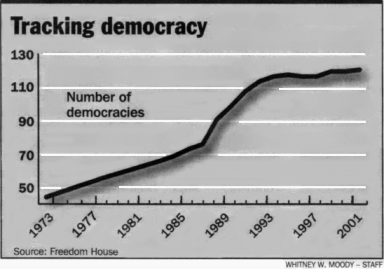The Christian Science Monitor
Wednesday, December 26, 2001
by John Hughes
Freedom marches undaunted
SALT LAKE CITY
ONE OF MY LAST images of 2001 is the photo, taken as Kabul was
liberated from the Taliban's hold, of joyful Afghans running
through the streets in smiling celebration. Other photos soon
followed, of Afghan men in sidewalk barber shops getting their
Taliban-mandated beards shorn, and of Afghan women shedding the
stifling, all-encompassing Taliban-decreed burqas for more
reasonable dress.
We do not know whether peace and stability will last in
Afghanistan, but for now its populace is enjoying a kind of
freedom that is a vast improvement over the fundamentalist
theocracy recently In place.
So, as 2001 draws to a close, another country moves out of the
"not free" category and at least Into the "partly
free" category and, with hope, toward the "free"
country category charted annually by a thoughtful Institution in
New York called Freedom House, which keeps an eye on all this.
This movement of nonfree people around the world into the
ranks of the free is one of the most significant and heartening
developments of our times. The flame of freedom is alight in the
breasts of people who have never experienced it during their
lifetimes, yet still understand its lure, are willing to fight
for it, and in some cases give their lives for it.
It is a noble and powerful motivation.
I have seen it spark dramatic change in Indonesia, where a
student generation that had never known democracy finally toppled
Sukarno's reign. Sometimes it comes relatively quickly as in the
Philippines and South Korea. Sometimes it is long drawn out as in
South Africa, where Gandhi pioneered passive resistance before
employing it in India, and where Africans had to endure the evils
of apartheid for decades before gaining their freedom. Almost
always it is dramatic, as when the Berlin Wall came crashing down
to herald the sound of falling dictatorial dominoes throughout
eastern Europe.
 But the
movement and direction are inexorable, and Freedom House's
current annual survey reports steady progress in the deepening of
democratic practices and the economic progress that goes with
them. Says freedom House president Adrian Karatnycky:
"Democracy and market systems appeared resilient in the lace
of terrorist and extremist challenges."
But the
movement and direction are inexorable, and Freedom House's
current annual survey reports steady progress in the deepening of
democratic practices and the economic progress that goes with
them. Says freedom House president Adrian Karatnycky:
"Democracy and market systems appeared resilient in the lace
of terrorist and extremist challenges."
Actually In 2001 the world "reached a new watermark"
in number of democratically elected governments. "Today we
have 192 governments and 121 of them (63 percent) are electoral
democracies. Almost 15 years ago there were only 66 (40 percent)
in a then total of 164. Between now and then we have added
another 55 democratically elected governments.
The free nations are mostly in western and east-central
Europe, in the Americas, and the Asia-Pacific region. Africa
doesn't have a very good record, and the Islamic world's is
deplorable. Says Mr. Karatnycky: "Since the early 1970s,
when the third major historical wave of democratization began,
the Islamic world, and in particular its Arabic core, have seen
little significant evidence of improvements in political
openness, respect for human rights, and transparency. Indeed, the
democracy gap between the Islamic world and the rest of the world
is dramatic."
Of the 14 Middle Eastern countries, only Israel and Turkey are
electoral democracies.
Does this mean that Islam is inherently incompatible with
democracy? Not so, says Karatnycky, as he points to democratic
ferment in such countries across the Islamic world as Albania,
Bangladesh, Djibouti, the Gambia, Indonesia, Mali, Niger,
Nigeria, Senegal, Sierra Leone, and Turkey.
And in India, which has the second-largest Muslim community in
the world, 150 million Muslims live under a democratically
elected government. Karatnycky continues, "Important, though
halting and inconsistent, inroads toward democratic reform have
been made in several Arabic countries."
AS NOVELIST Salman Rushdie suggested recently in The New York
Times, the questioning by moderate Muslims of extremist
"Islamism" is on the rise. "If Islam is to be
reconciled with modernity, these voices must be encouraged until
they swell into a roar."
As for terrorism's challenge, the analysts at Freedom House
are confident that the democratic nations will weather it and
prevail. One reason? Their economic strength. Free countries
today account for $27.1 trillion of the world's annual gross
domestic product. That's 87 percent of global economic activity.
The rest of the nonfree world accounts for only 13 percent. These
vast material and financial resources underline the "crucial
role played by political freedom and rule of law In spurring
economic progress."
Interestingly, in light of this link between democracy and
prosperity the 10 states listed "worst of the worst" In
the survey are: Cuba, North Korea, Afghanistan (until recently),
Iraq, Libya, Saudi Arabia, Sudan, Syria, and Turkmenistan.
John Hughes, a former editor of
the Monitor, is editor and chief operating officer of the Deseret
News.
 But the
movement and direction are inexorable, and Freedom House's
current annual survey reports steady progress in the deepening of
democratic practices and the economic progress that goes with
them. Says freedom House president Adrian Karatnycky:
"Democracy and market systems appeared resilient in the lace
of terrorist and extremist challenges."
But the
movement and direction are inexorable, and Freedom House's
current annual survey reports steady progress in the deepening of
democratic practices and the economic progress that goes with
them. Says freedom House president Adrian Karatnycky:
"Democracy and market systems appeared resilient in the lace
of terrorist and extremist challenges."